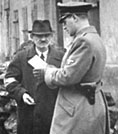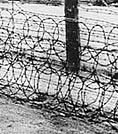 |
 Anne
was the teenage author of a diary she wrote when hiding from
the Nazis
in a prepared secret annexe behind an Amsterdam warehouse.
She was born in Frankfurt but her parents fled from Germany
to Amsterdam in 1933. She received her entire education in
Holland. In the summer of 1941, all public schools were closed
to Jews
under the German occupation and Anne was forced to attend
the Jewish High School. The following year Jewish deportations
from Holland began, under the guise of forced labour in the
East, Anne's family decided to go into hiding in the "annexe"
rooms at the back of the offices of Mr Frank's business premises
on Prinsengracht Street. The Frank family remained in their
hiding place from 9 July 1942 to 4 August 1944, together with
four other Jews, kept alive with the help of their non-Jewish
Dutch office workers. They were eventually betrayed and the
Gestapo
and Dutch police learned of their presence. The family was
deported to Westerbork camp and then to Auschwitz-Birkenau.
In November 1944 Anne arrived with her sister Margot in Bergen-Belsen,
where she fell ill and died of typhus in March 1945. Anne
was the teenage author of a diary she wrote when hiding from
the Nazis
in a prepared secret annexe behind an Amsterdam warehouse.
She was born in Frankfurt but her parents fled from Germany
to Amsterdam in 1933. She received her entire education in
Holland. In the summer of 1941, all public schools were closed
to Jews
under the German occupation and Anne was forced to attend
the Jewish High School. The following year Jewish deportations
from Holland began, under the guise of forced labour in the
East, Anne's family decided to go into hiding in the "annexe"
rooms at the back of the offices of Mr Frank's business premises
on Prinsengracht Street. The Frank family remained in their
hiding place from 9 July 1942 to 4 August 1944, together with
four other Jews, kept alive with the help of their non-Jewish
Dutch office workers. They were eventually betrayed and the
Gestapo
and Dutch police learned of their presence. The family was
deported to Westerbork camp and then to Auschwitz-Birkenau.
In November 1944 Anne arrived with her sister Margot in Bergen-Belsen,
where she fell ill and died of typhus in March 1945.
 Anne
had hoped to become an author and in her hiding place had
written several short stories as well as her diary. Immediately
following the arrest of Anne's family, Miep, one of the Dutch
office workers, found Anne's diary, which she kept, hoping
to return it to Anne after the war. Anne's father Otto Frank
survived the Holocaust
and after he received confirmation that both Margot and Anne
were dead, Miep handed him Anne's diary realising this was
Anne's lasting legacy. Having read its pages, Otto Frank agonised
over whether he should publish her private thoughts. He knew
Anne had always wanted to be a writer and he consulted various
people about his dilemma. He finally decided to find a publisher
for the diary. Anne
had hoped to become an author and in her hiding place had
written several short stories as well as her diary. Immediately
following the arrest of Anne's family, Miep, one of the Dutch
office workers, found Anne's diary, which she kept, hoping
to return it to Anne after the war. Anne's father Otto Frank
survived the Holocaust
and after he received confirmation that both Margot and Anne
were dead, Miep handed him Anne's diary realising this was
Anne's lasting legacy. Having read its pages, Otto Frank agonised
over whether he should publish her private thoughts. He knew
Anne had always wanted to be a writer and he consulted various
people about his dilemma. He finally decided to find a publisher
for the diary.
Anne
Frank has become a famous name because of her poignant diary,
which has been translated into many languages.
Anne
Frank's diary describes the frightening period experienced
by Anne, her family and friends in the annexe. It also expresses
her hopes and aspirations for the future, which were never
to be realised.
Text
by Robert Wistrich in "Lessons of the Holocaust",
produced by London Jewish Cultural Centreand HET, Second Edition
2000. The text is copyrighted to Robert S. Wistrich (1997).
Thanks to the Anne Frank Trust.
|
 |